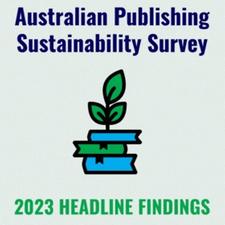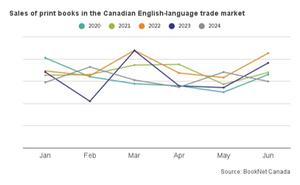 The Australian Publishers Association has released its inaugural Sustainability Survey, designed to help improve the environmental sustainability of the book industry. The APA noted that more than half of the publishers who responded have appointed a person or team to lead their company's sustainability agenda, and over a quarter are setting targets to reduce energy, waste and plastic consumption, as well as to increase recycling. "Unsurprisingly, given the complexity of the process, just 19% of respondents are currently calculating carbon emission for their Australian operations," the APA wrote.
The Australian Publishers Association has released its inaugural Sustainability Survey, designed to help improve the environmental sustainability of the book industry. The APA noted that more than half of the publishers who responded have appointed a person or team to lead their company's sustainability agenda, and over a quarter are setting targets to reduce energy, waste and plastic consumption, as well as to increase recycling. "Unsurprisingly, given the complexity of the process, just 19% of respondents are currently calculating carbon emission for their Australian operations," the APA wrote.
The Sustainability Survey found that:
- 56% of respondents have a person or team with direct responsibility for their company's sustainability agenda.
- More than a quarter are setting targets to reduce energy (30%), waste (26%), and plastic consumption (26%), as well as increase recycling (30%).
- 19% are calculating carbon emissions for their Australian operations.
- 44% are collecting environmental data from suppliers.
- 56% require suppliers to have accreditation.
- 33% use 100% FSC or recycled paper and cardboard for book printing, while a further 22% use 100% FSC or recycled paper but not cardboard.
The survey also investigated the use of plastic (laminated covers, foil, spot varnishes, glitter) in book production; transportation, returns and pulping; and the use of hard copy promotional material.
The APA's Sustainability Working Group identified five key areas from the survey where publishers could be taking action immediately:
- Nominate and appropriately resource a staff member or a team in your organization to be responsible for sustainability.
- Set up office recycling for paper, glass, soft and hard plastic, metal, batteries, and e-waste.
- Commit to 100% FSC or recycled stock for paper and cardboard in book printing.
- Reduce or eliminate the use of glitter and foil in book printing.
- Only supply printed proof copies and point of sale materials to booksellers that have specifically ordered them.
---
 BookNet Canada examined how the Canadian English-language book market has performed in the first half of 2024, using the latest data from SalesData, LibraryData, and the Canadian Book Consumer survey.
BookNet Canada examined how the Canadian English-language book market has performed in the first half of 2024, using the latest data from SalesData, LibraryData, and the Canadian Book Consumer survey.
SalesData figures showed that print unit sales for the first six months of 2024 were down 2% over the same period in 2023. In the first six months of 2024, for the entire English-language Canadian trade print book market tracked by BNC SalesData, 20,772,885 units were sold at a value of C$477 million (about US$352 million).
Print books comprised 83% (48% paperback, 25% hardcover) of all book purchases by Canadian book buyers during the first and second quarters of 2024. Digital book purchases increased 6% from year to year.
According to the consumer survey, Canadian book buyers have been buying more self-help titles this year, with the category comprising 22% of nonfiction purchases, up from 17% in 2023. In addition, interest in fantasy novels and thrillers has grown, with each category now accounting for 19% of all fiction purchases in the first half of 2024.
Regarding physical versus online shopping, the survey found that purchasing behavior of Canadian book buyers has remained relatively flat compared to 2023.
---
Country Living magazine showcased "10 independent bookshops to visit in the U.K.," noting that "the season of cozying up with a book is fast approaching, so there's no better time to celebrate the U.K.'s best independent bookshops--or perhaps discover a new favorite spot. Whether you're after a nature book to help you feel connected with the outdoors, some slow living inspiration or just a browse, there's no denying the simple pleasure of a meander around a well-curated bookshop." --Robert Gray

